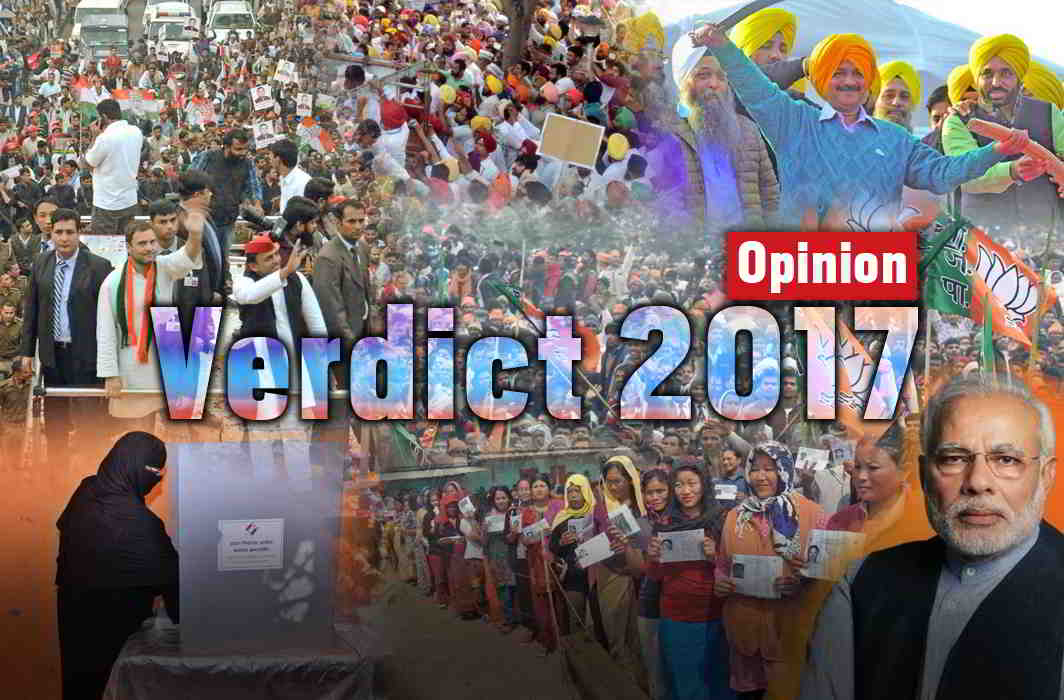[vc_row][vc_column][vc_column_text]There is no need to be overwhelmed by BJP’s superlative performance
By Parsa Venkateshwar Rao Jr
The temptation to focus exclusively on the verdict in Uttar Pradesh, and hence on Prime Minister Narendra Modi and Bharatiya Janata Party (BJP) president Amit Shah and the BJP is natural. UP is big and important, but it is important to remember not for India but for itself. India seems to progress very well on the economic and social front despite UP lagging far behind. But most politicians and political pundits seem to believe that UP is key Indian politics and to ruling India.
It is forgotten that from 1991 to 2009, it was not necessary for any party to win UP in order to form a government in Delhi. The BJP had won 51 from UP and 120 in Lok Sabha in 1991, 52 and 161 in 1996, 57 and 182 in 1998, 29 and 182 in 1999, 10 and 138 in 2004, 10 and 116 in 2009, 71 and 281 in 2014. When Congress led a coalition government in 2004 and 2009 with 145 and 206 seats in Lok Sabha, it had won 10 and 21 from UP.
The picture had changed in 2014, and it seemed that UP is back at the centre of Indian politics. BJP had won 71 seats in the Lok Sabha elections that year, and it enabled the party to go past the magical simple majority mark of 272 seats all on its own. The BJP managed to get 281 seats on its own. But the irony remains. Despite getting a landslide victory in UP, BJP just managed a simple majority in Lok Sabha. So, the importance of UP is simply exaggerated.[/vc_column_text][/vc_column][/vc_row][vc_row][vc_column][vc_column_text]
To interpret the victory of BJP as the victory of communal forces in UP would be a distortion of facts.
[/vc_column_text][/vc_column][/vc_row][vc_row][vc_column][vc_column_text]The point to be remembered is that UP’s assembly elections have logic of their own, and they should not be linked with a political party’s performance in the Lok Sabha election. There seems to be an apparent connection between the 71 seats that the BJP had won in the 2014 Lok Sabha election, and the 300 assembly seats it is set to win in 2017 assembly elections. But it would be nearer truth to keep the two apart. The successive successes of the BJP in the Lok Sabha and the UP assembly elections is indeed an impressive record but there is no necessary link between the two, and the speculation that it is a sign of how the BJP would do in 2019 Lok Sabha election is a little too far-fetched.
It is a known fact that no two elections are the same. The seats won will vary, and so will the percentage of votes. The seat tally might either go down or go up, and the vote percentage may remain nearly the same. This is not to take away credit from Modi, Shah and the BJP. Their assiduous work seems to have paid off. The party could have excited communal passion here and there it could have touched on the inflammatory communal card here and there. But it did not win this assembly election or the 2014 Lok Sabha election on a communal agenda despite elements of communalism in the poll campaign. To interpret the victory of BJP as the victory of communal forces in UP would be a distortion of facts.
What seems to have contributed to the overwhelming success of the BJP can be attributed to the split in the votes of SP due to the internal feud, the increasing marginalization of Congress. The poor performance of BSP will remain a puzzle, though the vote percentage remains impressive enough.
It is necessary to look at the assembly elections in the other four states. While BJP won Uttarakhand overwhelmingly, so did the Congress in Punjab. It has been a close fight in Goa and in Manipur, where BJP has an edge in Goa and Congress in Manipur.
The defeat of SP and BSP in UP should not be interpreted to mean that BJP has wiped out political opposition in the country as a whole. BJP has indeed emerged as a dominant party in the country’s politics, a position which was occupied by the Congress till the end of 1980s. The BJP had steadily climbed to the peak from 1991 to 2014 in Lok Sabha elections. [/vc_column_text][/vc_column][/vc_row]


 Latest world news17 hours ago
Latest world news17 hours ago
 Latest world news17 hours ago
Latest world news17 hours ago
 Latest world news16 hours ago
Latest world news16 hours ago
 India News16 hours ago
India News16 hours ago
 India News8 hours ago
India News8 hours ago
 Latest world news7 hours ago
Latest world news7 hours ago














